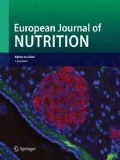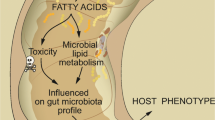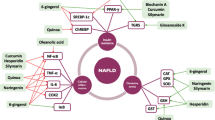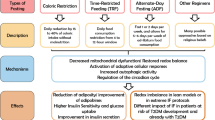Abstract
Purpose
Genistein (GEN) has been reported to have diverse biological activities, including antioxidant, hypolipidemic, and antidiabetic effects. This study investigated whether the ameliorative effects of GEN on inflammation and insulin resistance were associated with the modulation of gut microbiota composition in type 2 diabetic (T2D) mice.
Methods
C57BL/6J mice were treated with a high-fat diet/streptozotocin to induce T2D and then gavaged with GEN (20 and 40 mg/kg) for 8 weeks. Then, oral glucose tolerance, fasting blood glucose, serum insulin, glucagon, lipid profiles, and pro-inflammatory factors were measured. After this, hepatic function and histopathological analysis and inflammation-related indices of the liver and colon were determined, along with short-chain fatty acid (SCFA) and gut microbiota composition.
Results
GEN treatment decreased hyperglycemia, hyperlipidemia, and serum pro-inflammatory factor levels and attenuated hepatic dysfunction, pathological changes, inflammation-related protein expression, and hepatocyte apoptosis. It also ameliorated colonic pathological changes, tight junction-associated protein expression, and pro-inflammatory factor increases. Furthermore, high-dose GEN treatment increased the concentrations of SCFAs and down-regulated the ratio of Firmicutes/Bacteroidetes and the abundance of Proteobacteria at the phylum level. However, GEN increased the abundances of Bacteroides and Prevotella and decreased the levels of Helicobacter and Ruminococcus at the genus level in T2D mice.
Conclusion
GEN showed ameliorative effects on glucose and lipid dysmetabolism and hepatic and colonic dysfunction; most importantly, GEN could ameliorate inflammation and insulin resistance through modulation of gut microbiota composition.









Similar content being viewed by others
References
Li BY, Xu XY, Gan RY, Sun QC, Meng JM, Shang A, Mao QQ, Li HB (2019) Targeting gut microbiota for the prevention and management of diabetes mellitus by dietary natural products. Foods 8(10):440. https://doi.org/10.3390/foods8100440
Laakso M (2019) Biomarkers for type 2 diabetes. Mol Metab 27S:S139–S146. https://doi.org/10.1016/j.molmet.2019.06.016
Wang Q, Zhou J, Xiang Z, Tong Q, Pan J, Wan L, Chen J (2019) Anti-diabetic and renoprotective effects of Cassiae Semen extract in the streptozotocin-induced diabetic rats. J Ethnopharmacol 239:111904. https://doi.org/10.1016/j.jep.2019.111904
Davegardh C, Garcia-Calzon S, Bacos K, Ling C (2018) DNA methylation in the pathogenesis of type 2 diabetes in humans. Mol Metab 14:12–25. https://doi.org/10.1016/j.molmet.2018.01.022
Czech MP (2017) Insulin action and resistance in obesity and type 2 diabetes. Nat Med 23(7):804–814. https://doi.org/10.1038/nm.4350
Jia L, Li D, Feng N, Shamoon M, Sun Z, Ding L, Zhang H, Chen W, Sun J, Chen YQ (2017) A.nti-diabetic effects of Clostridium butyricum CGMCC0313.1 through promoting the growth of gut butyrate-producing bacteria in type 2 diabetic mice. Sci Rep 7(1):7046. https://doi.org/10.1038/s41598-017-07335-0
Tilg H, Moschen AR (2014) Microbiota and diabetes: an evolving relationship. Gut 63(9):1513–1521. https://doi.org/10.1136/gutjnl-2014-306928
Greenfield JR, Campbell LV (2006) Relationship between inflammation, insulin resistance and type 2 diabetes: “cause or effect”? Curr Diabetes Rev 2(2):195–211. https://doi.org/10.2174/157339906776818532
Koh A, De Vadder F, Kovatcheva-Datchary P, Backhed F (2016) From dietary fiber to host physiology: short-chain fatty acids as key bacterial metabolites. Cell 165(6):1332–1345. https://doi.org/10.1016/j.cell.2016.05.041
Macfarlane GT, Macfarlane S (2012) Bacteria, colonic fermentation, and gastrointestinal health. J AOAC Int 95(1):50–60. https://doi.org/10.5740/jaoacint.sge_macfarlane
Barlow GM, Yu A, Mathur R (2015) Role of the gut microbiome in obesity and diabetes mellitus. Nutr Clin Pract 30(6):787–797. https://doi.org/10.1177/0884533615609896
Xu YH, Gao CL, Guo HL, Zhang WQ, Huang W, Tang SS, Gan WJ, Xu Y, Zhou H, Zhu Q (2018) Sodium butyrate supplementation ameliorates diabetic inflammation in db/db mice. J Endocrinol 238(3):231–244. https://doi.org/10.1530/JOE-18-0137
Pussinen PJ, Havulinna AS, Lehto M, Sundvall J, Salomaa V (2011) Endotoxemia is associated with an increased risk of incident diabetes. Diabetes Care 34(2):392–397. https://doi.org/10.2337/dc10-1676
Qin JJ, Li YR, Cai ZM, Li SH, Zhu JF, Zhang F, Liang SS, Zhang WW, Guan YL, Shen DQ, Peng YQ, Zhang DY, Jie ZY, Wu WX, Qin YW, Xue WB, Li JH, Han LC, Lu DH, Wu PX, Dai YL, Sun XJ, Li ZS, Tang AF, Zhong SL, Li XP, Chen WN, Xu R, Wang MB, Feng Q, Gong MH, Yu J, Zhang YY, Zhang M, Hansen T, Sanchez G, Raes J, Falony G, Okuda S, Almeida M, LeChatelier E, Renault P, Pons N, Batto JM, Zhang ZX, Chen H, Yang RF, Zheng WM, Li SG, Yang HM, Wang J, Ehrlich SD, Nielsen R, Pedersen O, Kristiansen K, Wang J (2012) A metagenome-wide association study of gut microbiota in type 2 diabetes. Nature 490(7418):55–60. https://doi.org/10.1038/nature11450
Liu RM, Dai R, Luo Y, Xiao JH (2019) Glucose-lowering and hypolipidemic activities of polysaccharides from Cordyceps taii in streptozotocin-induced diabetic mice. BMC Complement Altern Med 19(1):230. https://doi.org/10.1186/s12906-019-2646-x
Yang R, Jia Q, Liu XF, Ma SF (2018) Effect of genistein on myocardial fibrosis in diabetic rats and its mechanism. Mol Med Rep 17(2):2929–2936. https://doi.org/10.3892/mmr.2017.8268
Zhou L, Xiao X, Zhang Q, Zheng J, Deng M (2019) Maternal genistein intake mitigates the deleterious effects of high-fat diet on glucose and lipid metabolism and modulates gut microbiota in adult life of male mice. Front Physiol 10:985. https://doi.org/10.3389/fphys.2019.00985
Mukund V, Mukund D, Sharma V, Mannarapu M, Alam A (2017) Genistein: Its role in metabolic diseases and cancer. Crit Rev Oncol Hematol 119:13–22. https://doi.org/10.1016/j.critrevonc.2017.09.004
Shi YN, Zhang XQ, Hu ZY, Zhang CJ, Liao DF, Huang HL, Qin L (2019) Genistein protects H9c2 cardiomyocytes against chemical hypoxia-induced injury via inhibition of apoptosis. Pharmacology 103(5–6):282–290. https://doi.org/10.1159/000497061
Gupta SK, Dongare S, Mathur R, Mohanty IR, Srivastava S, Mathur S, Nag TC (2015) Genistein ameliorates cardiac inflammation and oxidative stress in streptozotocin-induced diabetic cardiomyopathy in rats. Mol Cell Biochem 408(1–2):63–72. https://doi.org/10.1007/s11010-015-2483-2
Incir S, Bolayirli IM, Inan O, Aydin MS, Bilgin IA, Sayan I, Esrefoglu M, Seven A (2016) The effects of genistein supplementation on fructose induced insulin resistance, oxidative stress and inflammation. Life Sci 158:57–62. https://doi.org/10.1016/j.lfs.2016.06.014
Lopez P, Sanchez M, Perez-Cruz C, Velazquez-Villegas LA, Syeda T, Aguilar-Lopez M, Rocha-Viggiano AK, Del Carmen S-L, Torre-Villalvazo I, Noriega LG, Torres N, Tovar AR (2018) Long-term genistein consumption modifies gut microbiota, improving glucose metabolism, metabolic endotoxemia, and cognitive function in mice fed a high-fat diet. Mol Nutr Food Res 62(16):e1800313. https://doi.org/10.1002/mnfr.201800313
Li S, Huang Q, Zhang LW, Qiao XF, Zhang YY, Tang FS, Li ZB (2019) Effect of CAPE-pNO(2) against type 2 diabetes mellitus via the AMPK/GLUT4/GSK3β/PPARα pathway in HFD/STZ-induced diabetic mice. Eur J Pharmacol 853:1–10. https://doi.org/10.1016/j.ejphar.2019.03.027
Huang G, Xu J, Lefever DE, Glenn TC, Nagy T, Guo TL (2017) Genistein prevention of hyperglycemia and improvement of glucose tolerance in adult non-obese diabetic mice are associated with alterations of gut microbiome and immune homeostasis. Toxicol Appl Pharmacol 332:138–148. https://doi.org/10.1016/j.taap.2017.04.009
Liu ZQ, Liu T, Chen C, Li MY, Wang ZY, Chen RS, Wei GX, Wang XY, Luo DQ (2015) Fumosorinone, a novel PTP1B inhibitor, activates insulin signaling in insulin-resistance HepG2 cells and shows anti-diabetic effect in diabetic KKAy mice. Toxicol Appl Pharmacol 285(1):61–70. https://doi.org/10.1016/j.taap.2015.03.011
Sun J, Furio L, Mecheri R, van der Does AM, Lundeberg E, Saveanu L, Chen Y, van Endert P, Agerberth B, Diana J (2015) Pancreatic β-cells limit autoimmune diabetes via an immunoregulatory antimicrobial peptide expressed under the influence of the gut microbiota. Immunity 43(2):304–317. https://doi.org/10.1016/j.immuni.2015.07.013
Wang PC, Zhao S, Yang BY, Wang QH, Kuang HX (2016) Anti-diabetic polysaccharides from natural sources: a review. Carbohydr Polym 148:86–97. https://doi.org/10.1016/j.carbpol.2016.02.060
Behloul N, Wu G (2013) Genistein: a promising therapeutic agent for obesity and diabetes treatment. Eur J Pharmacol 698(1–3):31–38. https://doi.org/10.1016/j.ejphar.2012.11.013
Lee SR, Kwon SW, Lee YH, Kaya P, Kim JM, Ahn C, Jung EM, Lee GS, An BS, Jeung EB, Park BK, Hong EJ (2019) Dietary intake of genistein suppresses hepatocellular carcinoma through AMPK-mediated apoptosis and anti-inflammation. BMC Cancer 19(1):6. https://doi.org/10.1186/s12885-018-5222-8
Matulewicz N, Karczewska-Kupczewska M (2016) Insulin resistance and chronic inflammation. Postepy Hig Med Dosw (Online) 70:1245–1258
Su Z, Nie Y, Huang X, Zhu Y, Feng B, Tang L, Zheng G (2019) Mitophagy in hepatic insulin resistance: therapeutic potential and concerns. Front Pharmacol 10:1193. https://doi.org/10.3389/fphar.2019.01193
Jones JG (2016) Hepatic glucose and lipid metabolism. Diabetologia 59(6):1098–1103. https://doi.org/10.1007/s00125-016-3940-5
Miller RA, Birnbaum MJ (2016) Glucagon: acute actions on hepatic metabolism. Diabetologia 59(7):1376–1381. https://doi.org/10.1007/s00125-016-3955-y
Gruben N, Shiri-Sverdlov R, Koonen DP, Hofker MH (2014) Nonalcoholic fatty liver disease: a main driver of insulin resistance or a dangerous liaison? Biochim Biophys Acta 1842 11:2329–2343. https://doi.org/10.1016/j.bbadis.2014.08.004
He X, Shu J, Xu L, Lu C, Lu A (2012) Inhibitory effect of Astragalus polysaccharides on lipopolysaccharide-induced TNF-α and IL-1β production in THP-1 cells. Molecules 17(3):3155–3164. https://doi.org/10.3390/molecules17033155
Jia Q, Mehmood S, Liu X, Ma S, Yang R (2020) Hydrogen sulfide mitigates myocardial inflammation by inhibiting nucleotide-binding oligomerization domain-like receptor protein 3 inflammasome activation in diabetic rats. Exp Biol Med (Maywood) 245(3):221–230. https://doi.org/10.1177/1535370219899899
Chen X, Devaraj S (2018) Gut microbiome in obesity, metabolic syndrome, and diabetes. Curr Diabetes Rep 18(12):129. https://doi.org/10.1007/s11892-018-1104-3
Upadhyaya S, Banerjee G (2015) Type 2 diabetes and gut microbiome: at the intersection of known and unknown. Gut Microbes 6(2):85–92. https://doi.org/10.1080/19490976.2015.1024918
Bein A, Zilbershtein A, Golosovsky M, Davidov D, Schwartz B (2017) LPS induces hyper-permeability of intestinal epithelial cells. J Cell Physiol 232(2):381–390. https://doi.org/10.1002/jcp.25435
Gabele E, Dostert K, Hofmann C, Wiest R, Scholmerich J, Hellerbrand C, Obermeier F (2011) DSS induced colitis increases portal LPS levels and enhances hepatic inflammation and fibrogenesis in experimental NASH. J Hepatol 55(6):1391–1399. https://doi.org/10.1016/j.jhep.2011.02.035
Wen L, Duffy A (2017) Factors influencing the gut microbiota, inflammation, and type 2 diabetes. J Nutr 147(7):1468S-1475S. https://doi.org/10.3945/jn.116.240754
Wu R, Zhao D, An R, Wang Z, Li Y, Shi B, Ni Q (2019) Linggui zhugan formula improves glucose and lipid levels and alters gut microbiota in high-fat diet-induced diabetic mice. Front Physiol 10:918. https://doi.org/10.3389/fphys.2019.00918
Han LH, Li TG, Du M, Chang R, Zhan BY, Mao XY (2019) Beneficial effects of Potentilla discolor bunge water extract on inflammatory cytokines release and gut microbiota in high-fat diet and streptozotocin-induced type 2 diabetic mice. Nutrients 11(3):670. https://doi.org/10.3390/nu11030670
Hall AB, Yassour M, Sauk J, Garner A, Jiang XF, Arthur T, Lagoudas GK, Vatanen T, Fornelos N, Wilson R, Bertha M, Cohen M, Garber J, Khalili H, Gevers D, Ananthakrishnan AN, Kugathasan S, Lander ES, Blainey P, Vlamakis H, Xavier RJ, Huttenhower C (2017) A novel Ruminococcus gnavus clade enriched in inflammatory bowel disease patients. Genome Med 9(1):103. https://doi.org/10.1186/s13073-017-0490-5
Louis P, Hold GL, Flint HJ (2014) The gut microbiota, bacterial metabolites and colorectal cancer. Nat Rev Microbiol 12(10):661–672. https://doi.org/10.1038/nrmicro3344
Kovatcheva-Datchary P, Nilsson A, Akrami R, Lee YS, De Vadder F, Arora T, Hallen A, Martens E, Bjorck I, Backhed F (2015) Dietary fiber-induced improvement in glucose metabolism is associated with increased abundance of Prevotella. Cell Metab 22(6):971–982. https://doi.org/10.1016/j.cmet.2015.10.001
Acknowledgements
This work was supported by the Natural Science Research Project of the Education Commission of Anhui Province (No. KJ2018A0994).
Author information
Authors and Affiliations
Corresponding author
Ethics declarations
Conflict of interest
The authors declare no conflict of interest.
Rights and permissions
About this article
Cite this article
Yang, R., Jia, Q., Mehmood, S. et al. Genistein ameliorates inflammation and insulin resistance through mediation of gut microbiota composition in type 2 diabetic mice. Eur J Nutr 60, 2155–2168 (2021). https://doi.org/10.1007/s00394-020-02403-0
Received:
Accepted:
Published:
Issue Date:
DOI: https://doi.org/10.1007/s00394-020-02403-0




